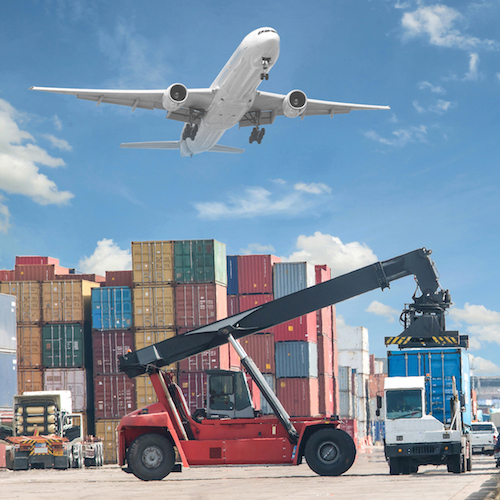Transportation
2016 Air Cargo Improves, but Trump a Wild Card for 2017

Published:
Last Updated:

Air cargo volume increased by 6.9% year over year in November, on top of a 6.2% increase posted in October, according to data reported Wednesday by WorldACD Market Data. While volume growth has been steadily improving, revenues and yields have been slower to rise but improved in the second half of 2016.
There is, however, some uncertainty over whether recent growth will continue into 2017. IHS Global Insight managing director of transportation advisory services Chuck Clowdis said, “We really don’t know if we should expect to see a continuation of this growth in 2017 ….”
WorldACD reported that exports from China and Hong Kong “played a major role” in November results. Year-over-year volume growth from Hong Kong improved by 30% while Shanghainese volume growth rose 17%.
The WorldACD also noted a marked shift in cargo traffic between Europe and Asia-Pacific:
[From 2010 to 2016], there was hardly any growth from Asia Pacific to Europe, but growth was 39% in the opposite direction, creating a reversal of the balance: air cargo volumes from Europe to Asia Pacific have now overtaken the volumes in the opposite direction, speaking for the increasing purchasing power of Asia.
President-elect Donald Trump’s threats to slap tariffs or taxes on imports have worried some in the industry. IHS Global Insights’ Clowdis told Logistics Management that Trump’s election has increased uncertainty for air freight carriers:
[T]here’s also been talk of certain goods shifting manufacturing and assembly to the U.S. from overseas. Will this have a positive or negative impact on air cargo rates and volumes? It’s too hard to predict at this stage.
So far Trump has blasted companies like Boeing and Lockheed with charging too much for goods they sell to the U.S. government and slapped carmakers Ford, GM and now Toyota for importing vehicles that could just as well be made in the United States. We have our own list of 10 more companies that could rouse Trump’s ire, mostly for sending manufacturing and service jobs outside the country.
A likely possibility is that Congress could enact a Trump plan for a “border adjustment tax.” Such a tax can eliminate the advantages that follow from U.S. firms manufacturing and retaining profits overseas. Such a tax could be trade neutral because changes to prices consumers pay for imported goods would be offset by increased strength in the U.S. dollar. The downside is that U.S. exports then become more expensive.
One industry a border adjustment tax would hit particularly hard is energy. The incoming Trump administration has proposed a 20% tax on crude imports while leaving exports untaxed. Energy economist and analyst Philip Verleger estimates that border adjustment taxes would drive the spread between West Texas Intermediate and Brent as high as 25%. A barrel of WTI that costs around $54 today would cost nearly $68 under such a tax scheme. U.S. retail prices would jump and exports of U.S. crude (and even some finished products) would vanish.
Credit card companies are pulling out all the stops, with the issuers are offering insane travel rewards and perks.
We’re talking huge sign-up bonuses, points on every purchase, and benefits like lounge access, travel credits, and free hotel nights. For travelers, these rewards can add up to thousands of dollars in flights, upgrades, and luxury experiences every year.
It’s like getting paid to travel — and it’s available to qualified borrowers who know where to look.
We’ve rounded up some of the best travel credit cards on the market. Click here to see the list. Don’t miss these offers — they won’t be this good forever.
Thank you for reading! Have some feedback for us?
Contact the 24/7 Wall St. editorial team.